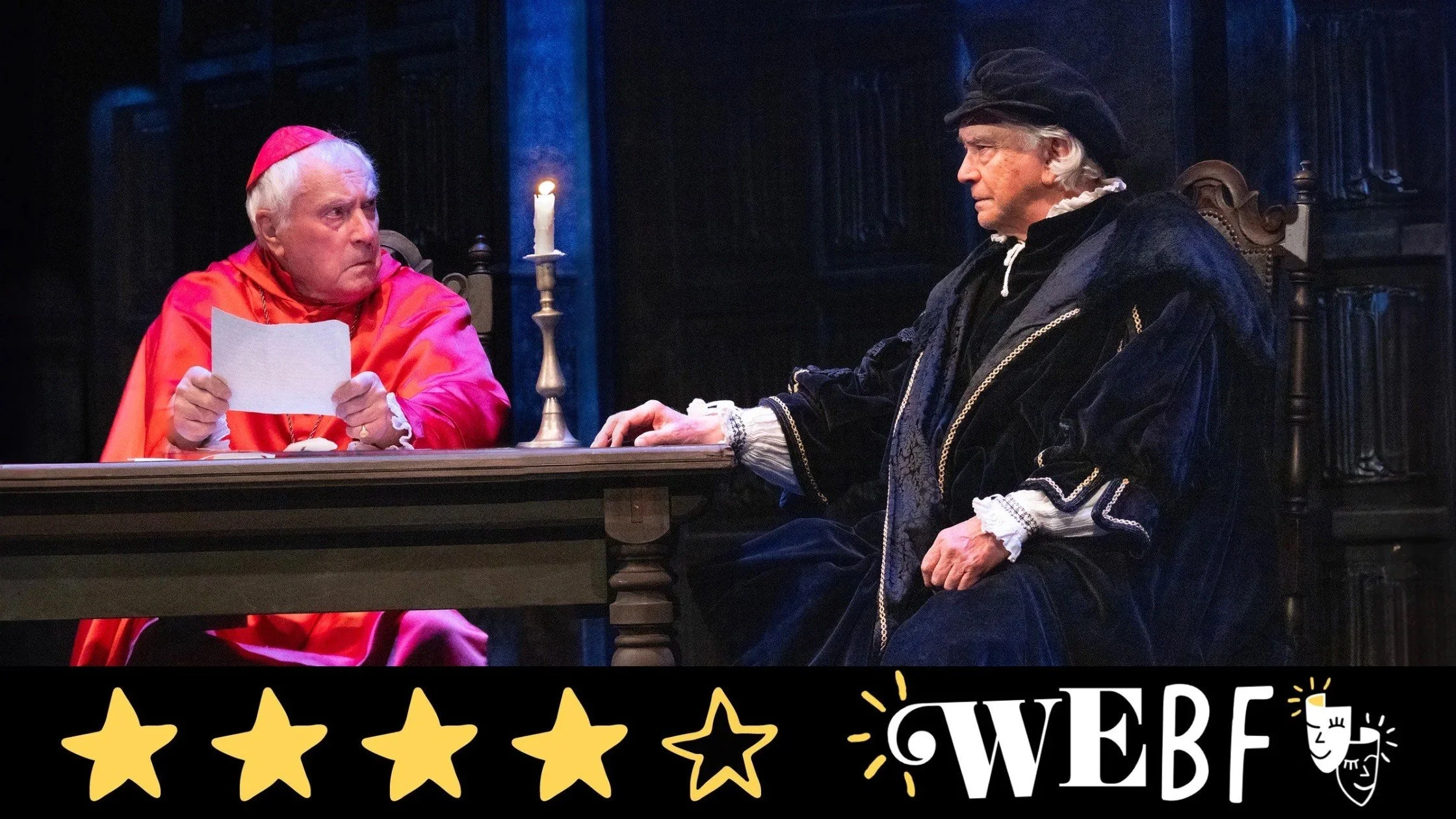Review: A MAN FOR ALL SEASONS, Theatre Royal Bath - Tour
Photo credit: Simon Annand
Robert Bolt’s classic 1960 masterpiece A Man for all Seasons begins a short UK tour at the wonderful Theatre Royal Bath and is a glorious insight into the courtly manoeuvrings, conspiracies and politics of the Henry VIII’s court between 1526 and 1532.
This was a critical period of British History in which the Church of England was established as Henry renounced Catholicism and the Pope in order to secure the divorce from his first wife Catherine of Aragon, the widow of his own dead brother. The consequences of the split and its aftermath of the reformation helped shaped Britain today. Wolf Hall on TV and the hit musical SIX continue to enthral audiences based on the events of Henry’s reign but this play focuses on one man, Sir Thomas More, the King’s reluctant chancellor from 1529 to 1532, a brilliant lawyer respected by many of his peers and admired by Henry. However, he held such strong catholic religious convictions that he could not bring himself to swear an oath of allegiance that put Henry as Head of the new Church of England, leading to him being found guilty of treason despite his patriotic loyalty.
It is a wordy play with thirteen named characters, each played by a different actor and a central role of the Common Man played by Gary Wilmot. He narrates and observes the action in the guise of the different ordinary folk whom More encounters, from the boat man who rows him to his home in Chelsea, his servant Matthew, a publican, his jailer, the jury foreman and finally his executioner. He breaks the fourth wall drawing us into the intrigue, helping us identify the characters and charming us with his dry wit and endearing persona. He represents the general public, always looking for a tip or hand out from the wealthy, melting into the background as the intrigue develops but being pulled back in by conspirators seeking his assistance. As he says to More when he is his jailer: “I’m a simple man and just want to keep out of trouble”.
Of course, the central character is Sir Thomas More played by Martin Shaw, returning to the role he played in the West End in 2006. With his deep husky sounding voice, he establishes the man’s religious sincerity, legal certainty , patriotism and family loyalty with ease. There is a delightful contrast between the touching scene in jail as his family urge him to take the oath to save his life, and the following trial scene as his accusers try to entrap him into making a statement to condemn himself. Bolt’s writing humanises the legal debate and beautifully brings out the sense of the fear of the King (or perhaps ambition to serve) and the respect and goodwill towards the accused man.
There is a very human story at the heart of the play, but it is the power politics of the nobility and church that shapes the outcome. With the help of the Common man, we quickly learn about their motives and loyalties. Cardinal Wolsey (Nicholas Day) served the King for so long but failed to deliver the divorce leading to his downfall. Thomas Cromwell (Edward Bennett), who engineered the annulment and was required to secure the Oath from More, was hungry for power and influence. The Duke of Norfolk (Timothy Watson) held many offices of state and survived the King but found his friendship to More tested at the trial. Richard Rich (Calum Finlay) was an ambitious young lawyer who would do anything to rise up the courtly ladder. Henry VIII (played by Orlando James) is a constant figure in the story but only appears once on a visit to More’s house where his love of music and fun hides his authoritarian demands for loyalty and obedience.
The whole production is sumptuously set and lit on a grandiose composite set of the wooden panelling of a Tudor Mansion, which seamlessly glides to transform into the Court, the jail and the riverside bank. The costumes denote status with the Common Man’s tunic that “barely covers a man’s nakedness” through to the period costumes of the nobility, the bright red vestments of the Cardinal, and the golden tunic of the King.
This is a wonderful historical play but in the week that we saw Trump’s triumphant return to power in the US, the tale of political games playing, retaliatory actions and bold statements of patriotism and religious allegiance, the historical events in the play resonate strongly. Those who tread the dangerous tightrope to remain in political posts as ambitious sycophantic courtiers vying for privilege can fall from grace as quickly as they rise. The need for supremacy, for a legacy and to make their country great, drive both Henry VIII and Trump. As More says as his fate becomes certain: “We see avarice, anger, greed, envy, pride, sloth, lust and stupidity commonly profit far beyond humility, chastity, fortitude, justice and thought, we must stand fast a little”. That sentiment feels as true today about national politics as it was in 1530.
**** Four stars
Reviewed by: Nick Wayne

